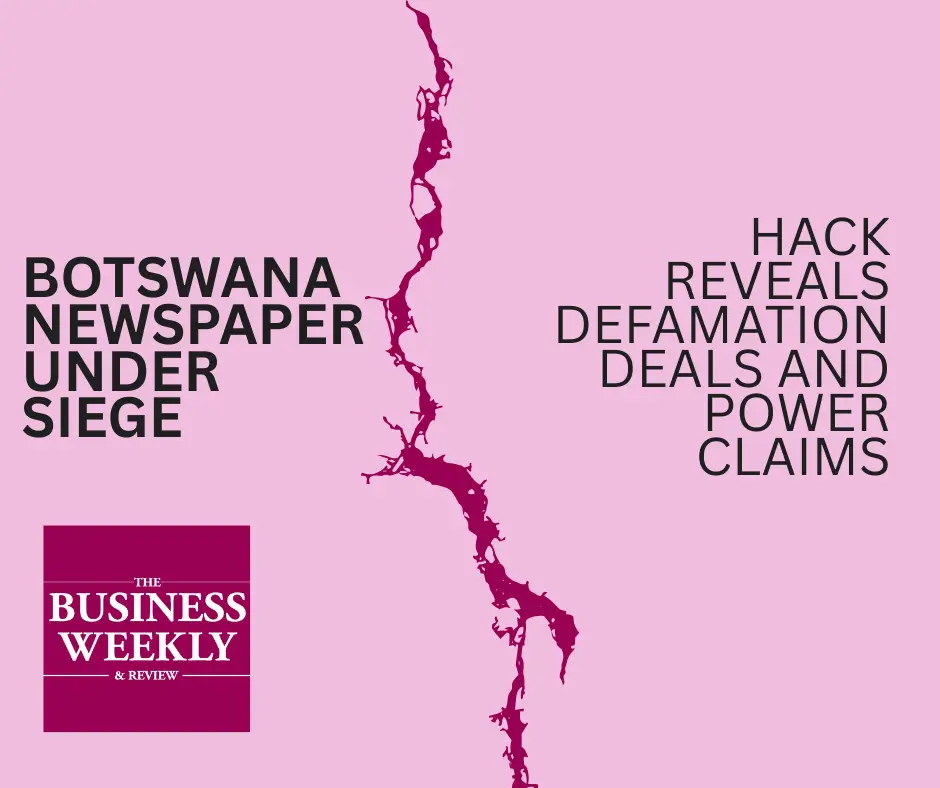In a startling incident that has shaken Botswana’s media landscape, the Businessweekly newspaper in Botswana was hacked, leaving journalists, readers, and businesses concerned about the safety of digital platforms in the country. This attack has not only disrupted the operations of one of Botswana’s most trusted financial publications but has also sparked broader debates about cyber resilience in the African media industry.
The Incident Unfolds
The Businessweekly, known for its in-depth reporting on finance, markets, and business developments in Botswana and Southern Africa, reportedly faced a serious cyberattack that compromised its online platforms and possibly sensitive data. While the full scope of the hack is still being investigated, preliminary reports suggest that attackers gained unauthorized access to the newspaper’s servers. This intrusion allegedly led to defaced web pages, interruption of publication schedules, and fears of leaked subscriber information.
For a media house that thrives on credibility, timeliness, and trust, such a disruption is not only a technological problem but also a reputational crisis. Readers who rely on the paper for accurate financial news may now question the integrity of its digital systems, while advertisers could reconsider their partnerships if security concerns linger.
Why Media Houses Are Targets
Cyberattacks on media outlets are not new. Globally, newspapers and digital publications have become lucrative targets for hackers because they often handle large amounts of personal subscriber data, sensitive business documents, and valuable intellectual property. In some cases, attacks are financially motivated, with hackers seeking ransom in exchange for restoring systems. In other cases, politically motivated actors attempt to silence independent journalism or manipulate public discourse by sabotaging trusted news sources.
For Botswana, which has long prided itself on a relatively free and open press, the hacking of a major financial newspaper signals a troubling trend. The incident shows that even in smaller media markets, no institution is immune from the reach of cybercriminals.
Potential Impact on Botswana’s Business Community
The Businessweekly caters to a specialized readership that includes business executives, policymakers, and investors. When such a platform is compromised, the consequences ripple beyond journalism into the economy itself.
- Loss of Investor Confidence: Foreign and domestic investors rely on accurate reporting to make informed decisions. A cyberattack could cast doubts on the reliability of business data being reported.
- Risk to Advertisers: Companies that advertise in the newspaper might worry that their information could be tampered with or exposed, potentially leading to financial losses or reputational harm.
- Data Privacy Concerns: If subscriber information such as emails, phone numbers, or payment details were accessed, individuals and companies could face risks of identity theft or phishing schemes.
The Larger Cybersecurity Landscape in Botswana
Botswana, like many African nations, is undergoing rapid digital transformation. From banking to retail, more services are moving online, making cybersecurity an essential pillar of national development. However, incidents like the Businessweekly hack reveal that there may be gaps in preparedness.
While the government has invested in national ICT strategies, there is still limited awareness about cyber hygiene among smaller institutions. Media houses, which often operate on tight budgets, may not always allocate sufficient resources to cybersecurity infrastructure. Firewalls, encryption, intrusion detection systems, and regular security audits are crucial but often overlooked in the face of financial constraints.
Lessons for the Media Industry
The hack of the Businessweekly newspaper should be treated as a wake-up call, not only for Botswana but for the African media industry as a whole. Several lessons can be drawn from this incident:
- Prioritize Cybersecurity Budgets: Media outlets must view cybersecurity as a core operational expense, not an optional add-on. Allocating funds for professional IT security services is vital.
- Staff Training: Many cyberattacks begin with human error, such as clicking on malicious links. Regular training of journalists and staff on phishing, password hygiene, and safe browsing practices is essential.
- Regular Audits and Backups: Independent cybersecurity audits and regular data backups ensure that even in the event of a breach, systems can be restored without crippling downtime.
- Collaboration with Authorities: Media organizations should build stronger ties with cybersecurity regulators, law enforcement, and regional cybercrime bodies to share intelligence and strengthen defenses.
- Transparent Communication: Once a breach occurs, transparency with readers and stakeholders is crucial. Attempts to hide incidents can erode trust more than the hack itself.
The Broader Social Implications
When a newspaper is hacked, the issue extends beyond technology and finance—it touches on democracy and the public’s right to information. Newspapers like the Businessweekly are critical for holding power to account and providing citizens with reliable business reporting. By targeting such outlets, hackers indirectly attack the flow of information in society.
If cyber threats continue to grow unchecked, there is a risk of self-censorship, loss of journalistic independence, and erosion of public trust in digital media. This could weaken the watchdog role of journalism, which is vital in a democracy like Botswana.
Moving Forward
Botswana’s media and business communities must respond to this incident with resilience. The Businessweekly itself will need to rebuild its systems and reputation, ensuring its readers that it can continue delivering trustworthy content. Meanwhile, other media outlets should not wait until they are victims to act—they must proactively strengthen their defenses.
On a national level, policymakers should consider revisiting cybersecurity regulations, offering support to media organizations, and fostering collaborations between government, private sector, and academia to address these emerging threats. Creating a national awareness campaign on cybersecurity could also help both institutions and individuals develop better digital resilience.
Conclusion
The hacking of the Businessweekly newspaper in Botswana is more than an isolated cyber incident. It is a signal flare, warning that the country’s media sector must urgently adopt stronger cybersecurity measures. In an increasingly digital world, trust in news platforms hinges not only on journalistic integrity but also on the security of the systems that deliver that news.

